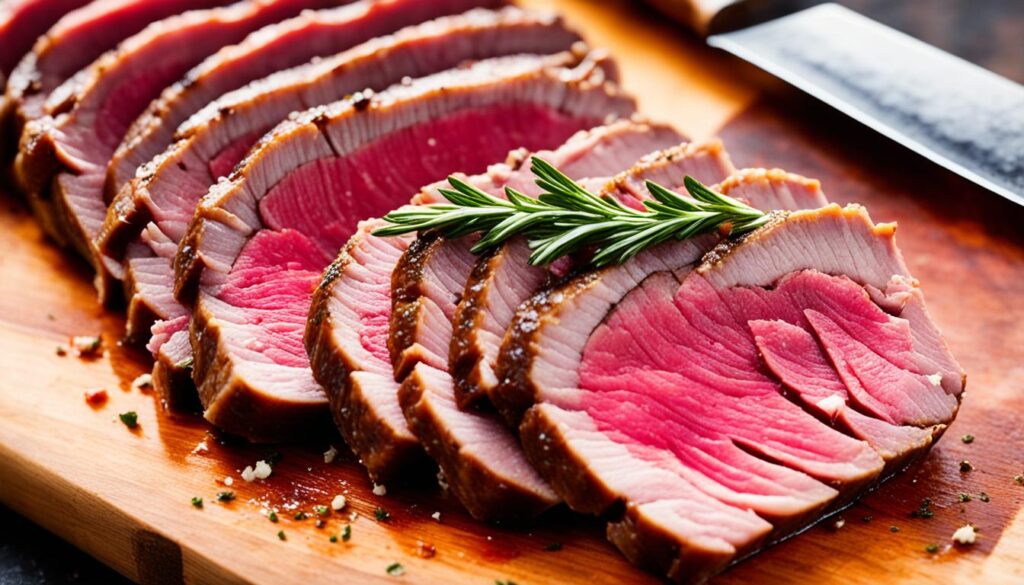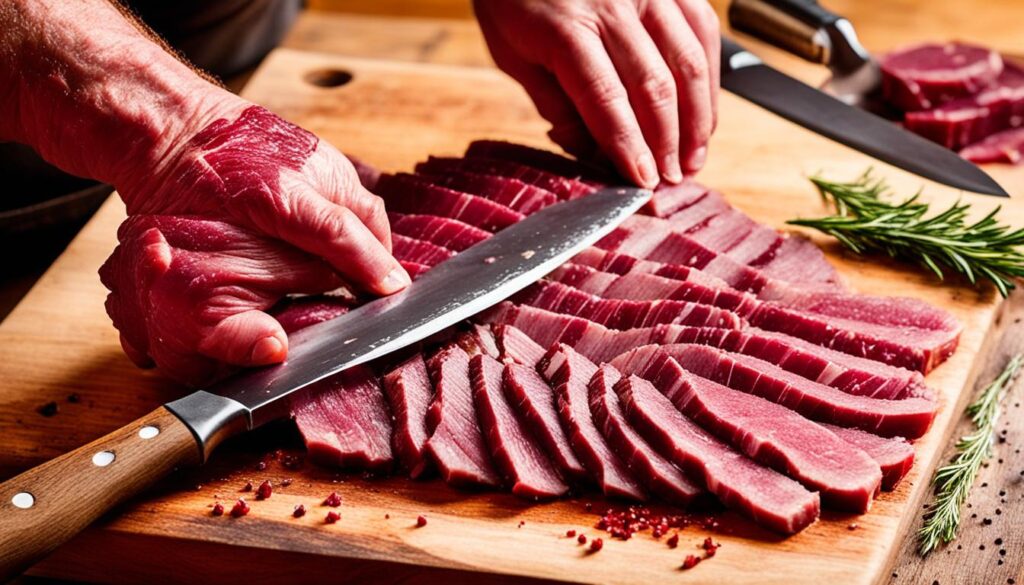Dive into the exquisite world of venison backstrap with this succulent recipe guide. Known for its extraordinary tenderness and deep, rich flavor, venison backstrap stands as a gourmet delight on par with the finest cuts of steak. When cooked to perfection, it becomes the centerpiece of a meal that leaves a lasting impression. Master the art of preparing and cooking venison with our thoroughly detailed steps, transforming any dining experience into a luxurious culinary feast.
Key Takeaways
- Venison backstrap is celebrated for its tenderness and rich flavor.
- Proper trimming and cleaning are crucial for the best results.
- Marinating enhances the backstrap’s natural taste.
- Grilling, pan-searing, and oven roasting are ideal cooking methods.
- Step-by-step instructions ensure foolproof preparation.
Introduction to Backstrap Cooking
Venison backstrap, often heralded as a delicacy among hunters and culinary experts, is renowned for its tender texture and rich flavor. Understanding how to cook backstrap begins with knowing its origins and intrinsic qualities. The backstrap is the loin muscle that runs along the spine of the deer and is considered a flagship cut due to its tenderness and succulence.
In the culinary world, mastering venison cooking tips is essential for making the most of this exquisite meat. The backstrap’s exquisite flavor profile makes it a versatile choice for various cooking methods. From field dressing to the final presentation on your plate, a thorough knowledge of backstrap basics will ensure that each serving is a culinary triumph.
Here’s a quick comparison of backstrap to other venison cuts to illustrate its uniqueness:
| Cut of Meat | Tenderness | Flavor | Recommended Cooking Methods |
|---|---|---|---|
| Backstrap (Loin) | Highly Tender | Rich and Mild | Grilling, Pan-Searing, Oven Roasting |
| Shoulder (Chuck) | Moderately Tough | Robust | Braising, Slow Cooking |
| Hindquarter (Round) | Firm | Strong | Roasting, Grilling |
Utilizing these venison cooking tips, you can elevate any dish with the luxurious taste and texture of the backstrap. This introductory knowledge provides a solid foundation, whether you are a novice or a seasoned cook looking to refine your approach to backstrap basics.
Ingredients Needed for the Backstrap Recipe
Crafting a delicious venison backstrap recipe is all about balancing primary and secondary components. From selecting the freshest cuts to mastering the art of seasoning venison, knowing what you need is crucial for a mouthwatering meal.
Primary Ingredients
Your primary venison ingredients should be of the highest quality. The star of the dish is undoubtedly the venison backstrap itself. Ensure it’s fresh and properly stored to maintain its tenderness and flavor.
- Fresh venison backstrap
- Olive oil
- Garlic cloves
- Onion
Seasonings and Spices
Seasoning venison is an art that enhances the meat’s natural flavors. A well-crafted blend of spices can turn a simple dish into an extraordinary culinary experience. Commonly used spices include rosemary, thyme, and black pepper.
- Salt
- Black pepper
- Rosemary
- Thyme
Optional Extras
While the basic components suffice for a delightful meal, adding optional extras can elevate the dish. You can incorporate a flavorful backstrap marinade recipe or add side dishes to create a balanced meal.
- Red wine for marinade
- Soy sauce
- Lemon juice
- Mushrooms
| Ingredient Type | Items |
|---|---|
| Primary Ingredients | Venison backstrap, olive oil, garlic, onion |
| Seasonings and Spices | Salt, black pepper, rosemary, thyme |
| Optional Extras | Red wine, soy sauce, lemon juice, mushrooms |
Preparing the Venison Backstrap
Ensuring your venison backstrap is properly prepared is key to achieving a delicious and tender meal. This process begins with meticulous venison trimming and cleaning, followed by marinating the meat to enhance its flavor profile.
Trimming and Cleaning
Start the process of preparing venison by carefully trimming the backstrap. Use a sharp knife to remove any excess fat, silver skin, and sinew that can toughen the meat during cooking. This step in venison trimming is crucial for maintaining the tenderness and allowing flavors to penetrate more effectively.
After trimming, thoroughly rinse the backstrap under cold water to remove any remaining debris and pat it dry with paper towels. Proper cleaning ensures that your venison is ready for the marinating phase.
Marinating Tips
Incorporating a venison marinade is a highly effective way to infuse flavor and tenderness into the meat. When preparing venison, consider using a marinade that includes acidic ingredients such as vinegar, wine, or citrus juice to break down the muscle fibers. This enhances both taste and texture.
- Time Frame: Marinate for at least 4 to 6 hours. For deeper flavor, you can let it sit overnight in the refrigerator.
- Ingredients: Popular choices include olive oil, garlic, rosemary, thyme, soy sauce, and black pepper.
Seal the marinating venison in a zip-lock bag or a covered dish to keep it immersed in the marinade. Rotate the bag or stir the marinade occasionally to ensure even distribution.
Best Cooking Methods for Tender Venison
When it comes to cooking venison backstrap, choosing the right method can elevate your culinary experience. Each technique offers unique benefits, allowing you to tailor your approach depending on your preferences and available tools. This section will guide you through the nuances of grilling venison, searing backstrap to perfection, and oven-roasting venison to achieve a mouthwatering result.
Grilling Techniques
Grilling venison is a popular method that infuses the meat with a smoky flavor. Begin by preheating your grill to medium-high. Once ready, place the seasoned backstrap directly on the grates. Cook until the exterior is nicely charred but the inside remains tender. Regularly turn the meat to ensure even cooking, and use a meat thermometer to check for your desired doneness.
Pan-Seared Perfection
If you’re aiming for a deeply flavorful crust, searing backstrap in a hot skillet is an excellent choice. Start by heating a heavy skillet over high heat and adding a small amount of oil. Place the backstrap in the pan and sear each side for about 2-3 minutes, or until a golden-brown crust forms. To avoid overcooking, transfer the meat to a warm oven to finish cooking if needed.
Oven Roast Recommendations
For a more hands-off approach, consider oven-roasting venison. Preheat your oven to 375°F. Season the backstrap and place it on a baking sheet or in a roasting pan. Roast until the internal temperature reaches the optimal level for tenderness. This method ensures even cooking and allows the flavors to develop fully without constant attention.
| Cooking Method | Key Points | Best For |
|---|---|---|
| Grilling | Smoky flavor, medium-high heat, frequent turning, monitor doneness | Outdoor cooking, smoky aroma lovers |
| Pan-Searing | High heat, quick sear, finish in oven if necessary | Quick meals, crust lovers |
| Oven-Roasting | 375°F, consistent heat, low-maintenance | Even cooking, flavor development |
Backstrap Recipe: Step-by-Step Instructions
Embarking on the venison backstrap journey promises a rewarding culinary experience. Let’s dive into the detailed steps to ensure that your venison backstrap turns out tender and flavorful. These step-by-step instructions offer a seamless approach to backstrap cooking, enabling you to master the art effortlessly.
Step One: Preparing the Ingredients
Your first task is to prepare all the necessary ingredients. Ensure your venison backstrap is properly trimmed and marinated as per our earlier recommendations. This preparation lays the foundation for a delectable dish. Gather your primary ingredients and seasoning mix, ensuring everything is within reach. Proper preparation guarantees smooth and efficient cooking.
Step Two: Cooking the Backstrap
Next, choose your preferred cooking method – grilling, pan-searing, or oven roasting – to cook the backstrap. If grilling, preheat the grill to medium-high heat and cook for about 4-5 minutes per side until you reach your desired doneness. For pan-searing, heat a skillet over medium-high heat, add a splash of oil, and cook each side for approximately 3-4 minutes. If oven roasting, preheat your oven to 375°F and roast the backstrap for about 15-20 minutes, ensuring the internal temperature reaches around 130-135°F for medium-rare. These detailed backstrap cooking instructions should cater to your preferred technique.
Step Three: Serving Suggestions
Finally, let’s discuss how to serve your perfectly cooked venison backstrap. Allow the meat to rest for a few minutes before slicing to retain its juiciness. For an exquisite presentation, slice the backstrap into medallions and arrange them on a warm platter. Pair with roasted vegetables, a fresh garden salad, or mashed potatoes to complete the meal. Adding a rich red wine reduction or a simple herb butter over the slices can elevate the flavors. These venison serving tips will ensure your dish not only tastes great but also looks like a gourmet masterpiece.
FAQ
What is venison backstrap?
Venison backstrap is a tender cut of meat taken from the loin of a deer, known for its rich flavor and tenderness. It’s a favorite among hunters and gourmet chefs for its versatility and exquisite taste.
How do you properly trim and clean a venison backstrap?
To properly trim and clean a venison backstrap, start by removing any silver skin and fat. Use a sharp knife to carefully separate these parts without cutting into the meat itself. Rinse the meat under cold water and pat dry with paper towels.
What are the best seasonings and spices for venison backstrap?
The best seasonings for venison backstrap include salt, pepper, garlic, rosemary, and thyme. Additionally, you can use paprika for a smoky flavor or marinate with red wine and soy sauce for an extra depth of taste.
How long should I marinate venison backstrap?
For optimal flavor, marinate venison backstrap for at least 4 to 6 hours. If you have more time, marinating overnight can help to enhance the flavor further and ensure the meat is tender.
What are the best cooking methods for venison backstrap?
The best cooking methods for venison backstrap include grilling, pan-searing, and oven roasting. Each method has its own advantages, such as achieving a smoky flavor with grilling, a perfect crust with pan-searing, or consistent tenderness with oven roasting.
How do I grill venison backstrap to perfection?
To grill venison backstrap to perfection, preheat the grill to medium-high heat. Sear the backstrap for 2-3 minutes on each side to develop a crust, then move it to indirect heat and cook until it reaches an internal temperature of 130-135°F for medium-rare.
What are some serving suggestions for venison backstrap?
Serve venison backstrap with sides like roasted vegetables, mashed potatoes, or a fresh salad. Garnish with fresh herbs such as parsley or thyme, and consider a sauce like red wine reduction or mushroom gravy to complement the meat.
Can I prepare venison backstrap in an oven?
Yes, you can prepare venison backstrap in an oven. Preheat your oven to 375°F. Sear the backstrap in a hot pan with oil until browned on all sides, then transfer it to the oven and roast for 12-15 minutes, or until the internal temperature reaches 130-135°F for medium-rare doneness.
What are some tips for pan-searing venison backstrap?
To pan-sear venison backstrap, heat a pan over high heat and add oil. Once the oil is hot, place the backstrap in the pan and sear each side for 2-3 minutes until browned. Reduce the heat to medium and cook until the internal temperature reaches 130-135°F for medium-rare. Let it rest before slicing.
What ingredients do I need for a venison backstrap marinade?
A basic venison backstrap marinade can include olive oil, soy sauce, red wine, garlic, onion, black pepper, and a touch of honey or brown sugar. Adjust the ingredients to your taste preferences to enhance the flavor of the meat.

